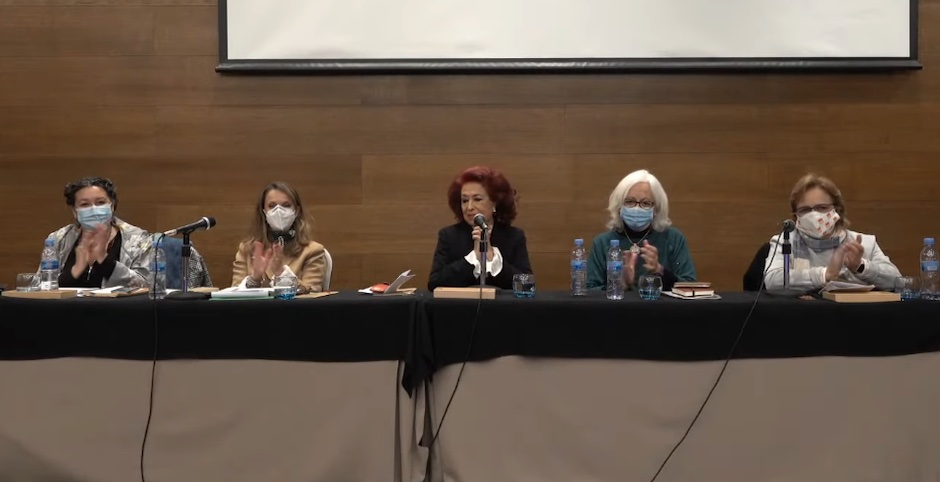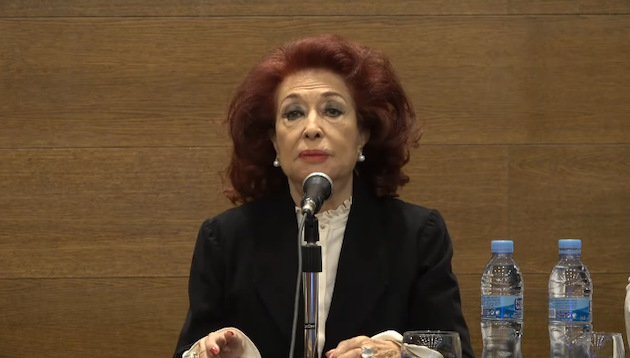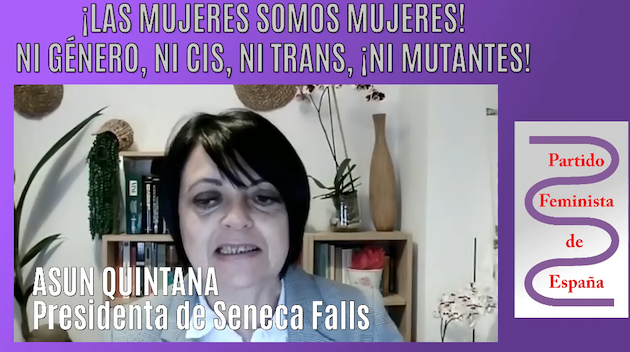Women from a wide range of organisations and political views, including an evangelical pastor, explained the dangers of the 'trans draft law' at a round table organised by the Feminist Party.
 Participants at the round table organised by the Spanish Feminist Party./ Youtube.
Participants at the round table organised by the Spanish Feminist Party./ Youtube.
The Spanish 'trans draft law' is not only generating a debate in the media and political sphere, but it is also beginning to be a main topic in several public forums, meetings and talks.
The Spanish Feminist Party recently organised a round table with speakers from different professions, political and social sensibilities, who presented their critical view on the 'trans draft law' that is being developed in Spain.
“There is a lot of social passivity”, denounced historical Spanish feminist Lidia Falcón at the beginning of the round table that was held in Madrid, although many participated online. The meeting was broadcast on YouTube and followed live by hundreds of people.
Falcón welcomed the speakers, stressing that it was necessary to seek synergies between different social actors, to face the “emergency” that this draft law brings.
The leader of the Spanish Feminist Party pointed out that they “want to promote opposition from civil society, with the participation of all the social sectors that understand that sexual self-determination cannot be turned into a law”.
“I am upset because this is a corruption of society. As human beings, we have to be outraged and run a popular, effective campaign. This draft law cannot pass”, added Falcón.
Lawyer and former judge Elena Rábade warned that “they want to introduce sexual choice into the law and change the concept of man and woman to ‘masculine’ and ‘feminine’, which will depend on how you feel. This will generate enormous legal insecurity”.
She insisted on the lack of protection for those parents who do not want to “support” their children in the transition, up to the point of losing custody of their children.
“This draft law attacks and encroaches on laws that protect women and leads to the erasure of women in practical terms. They attack the legal security and the rights that we have been winning”, said Rábade.

According to Cruz Torrijos, psychologist and expert in equality, “this is an affirmative model of transsexuality. First of all, it is based on the idea that sex does not exist and that the inner identity will reveal itself at some point. That idea is cultish”.
“What is the point of going into a classroom of children and telling them that they may have been born in the wrong bodies and are not the sex they think they are? They are inoculating them with a doubt that doesn't make sense, it doesn't stimulate critical thinking, but something that will have health consequences”, warned the psychologist.
Torrijos believes that there is also a media campaign to accept concepts such as “trans childhood” which, in her opinion, is “a nonsense” without no scientific backing. “This is a dogma, an aberration that they want to shield by law”.
“Anyone who expresses this truth must be reaffirmed by the whole environment: parents, health workers, teachers. They are deprived of the possibility that at the end of puberty the problem will go away, as it does 80-90% of the time”, lamented Torrijos.
This is having a “devastating” effect on girls and teenagers. Other countries have seen “up to a 4,000% increase in girls who don't want to be women, because they can be trans boys, they have seen it on social media, they have been told so at school”, she added.
Torrijos denounced the impact that pornography is also having on the behaviour of boys and girls, because it is filling relationships with violence and making it more difficult, especially for girls, to be comfortable with their bodies.
Teresa García Noblejas, representing the Hazte Oir social platform, explained the bus initiative they organised, visiting several Spanish cities to call for an end to trans ideological intrusion in schools.
“The children are the ones who suffer the most, because of the doubts they have about themselves”, said García, who encouraged people to sign an online petition they have set up to ask the government to “put a definitive end” to the trans draft law.
Professor Amelia Varcárcel explained that “all this began in the 1990s, when the queer theory was developed in American universities, which clashes with the feminist agenda. Feminism is the abolition of stereotypes”.
“The neutralisation of language leads to anonymity. We end up embracing the idea that the problem is not patriarchal, but individual, not social, but of choice, as if the problem was to choose what we want to be”, underlined Venezuelan feminist activist Eglims Pañuela.
Zulema Díaz, an activist of an association that works with migrants, warned that “this laws will also affect migrant women. We are concerned that children may have irreversible changes in their bodies as a result of decisions they make when they do not yet have the capacity to do so”.
The meeting was closed by evangelical pastor and coordinator of the Christian group Seneca Falls and the Women's Working Group of the Spanish Evangelical Alliance, Asunción Quintana, who denounced that the 'trans draft law' “is full of ideology, there is no science and the issue of puberty blockers for minors is dangerous and there is no warning of its consequences”.
Quintana stressed that the law proposes an “à la carte legal change of sex that will lead to serious problems of coexistence”.
“It is a law that is based on dogmas and not on scientific evidence, it restricts freedom of conscience, it invades the competences of civil society and families”, which is why it is necessary to firmly oppose it and to ask politicians to listen "and to recover the spirit of democracy”.

To close the round table, Lidia Falcón called for more voices to be heard, so that society could be aware of the dangers of the 'trans draft law', and said that they hope that more people, entities and associations of all kinds will show their opposition in the coming weeks.

Las opiniones vertidas por nuestros colaboradores se realizan a nivel personal, pudiendo coincidir o no con la postura de la dirección de Protestante Digital.
Si quieres comentar o